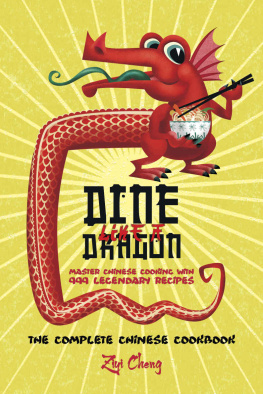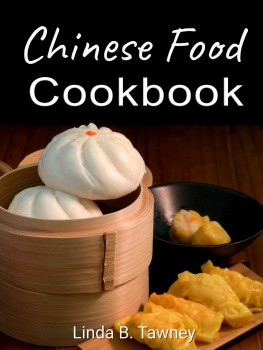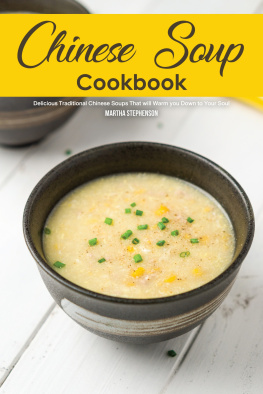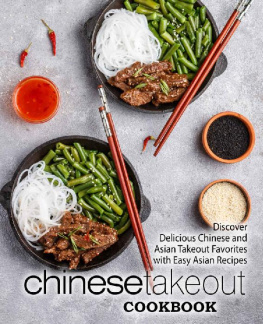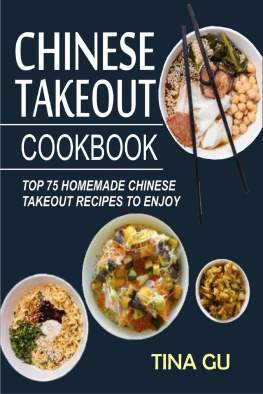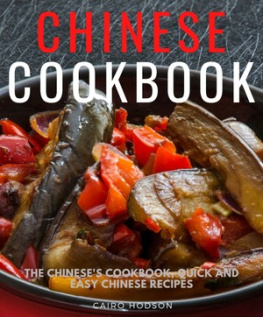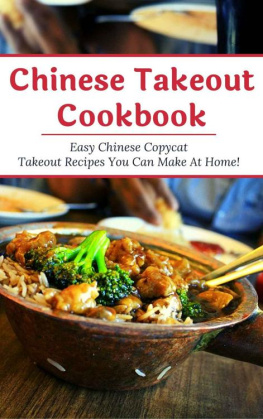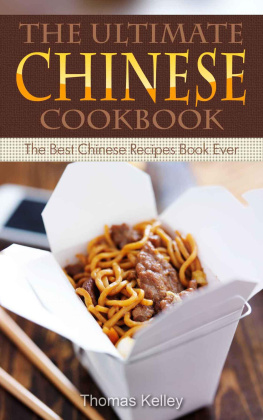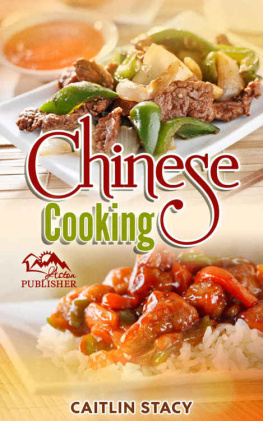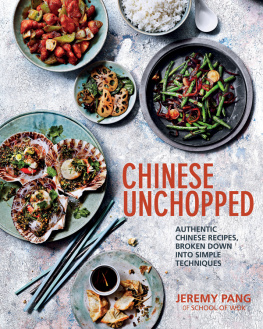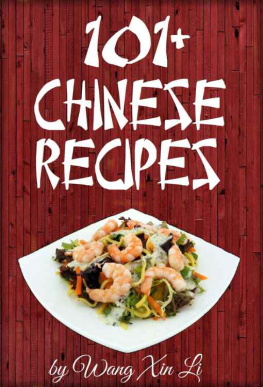Dine Like a Dragon:
The Complete Chinese Cookbook
Master Chinese Cooking with 999 Legendary Recipes
Ziyi Cheng
Contents
Introduction
Chinese food requires no introduction. It is some of the most popular and commonly available food, regardless of where you live. Chinese food is diverse, and tastes absolutely amazing. All you need is fire and a stove to cook most of the recipes, and they dont take much time either. Delicious, easy, and quick- Chinese food is a must-have in the arsenal of any cook.
Although any stovetop will get the job done in a pinch, if youre really serious about cooking Chinese dishes the Chinese way, you should go get a wok. If you want to try out the recipes in this book before you invest in a wok, that is fine too.
Know Your Measurements
American cooks use standard containers, the 8-ounce cup and a tablespoon that takes exactly 16 level fillings to fill that cup level. Measuring by cup makes it very difficult to give weight equivalents, as the density plays an important role when it comes to weight. The easiest way therefore to deal with cup measurements in recipes is to take the amount by volume rather than by weight. Thus, the equation reads:
1 cup = 240ml = 8 fluid Ounces
cup = 120ml = 4 fluid ounces
It is possible to buy a set of American cup measures in major stores around the world.
In the States, butter is sometimes measured in sticks. One stick is the equivalent of 8 tablespoons. One tablespoon of butter is therefore the equivalent to ounce/15 grams.
Liquid Measures
1 Teaspoon= 5 Millilitres
1 Tablespoon = 14 millilitres
2 Tablespoons= 1 Fluid Ounce
Solid Measures
1 Ounce= 28 Grams
16 Ounces= 1 Pound
General Guidelines
- Approximation is fine. Feel free to increase or decrease the amount of ingredients to suit your taste. It helps to have measuring equipment in the kitchen.
- Quite a few recipes in this book call for eggs. The eggs used are size 3 unless mentioned otherwise. Size 3 eggs are the most common medium sized eggs available.
- It is usually a good idea to clean all the fresh ingredients before using them in recipes.
- Even if it is not mentioned in the recipe, onions used are always peeled, and carrots are washed and then scrubbed or peeled.
- It is usually a good idea to taste the food during the cook to reach your desired amount of seasoning. Therefore, it is usually a good idea to use less seasoning at the start of the cook. More seasoning can always be added later, but it is impossible to extract, so keep that in mind.
- Freshly ground pepper if best. If you wish to use pepper readily available in the market, use Szechuan peppercorns. If you dont have anything on hand, conventional black pepper will do in a pinch.
- Chinese recipes commonly call for herbs. Both fresh and dried herbs will get the job done, but it goes without saying that fresh herbs are always better if you can get your hands on them. However when it comes to garnishing, fresh herbs are your only option.
- Experimentation is good. Think of the recipes in this book as a bland canvas. Once you get a hang of these Chinese recipes, feel free to play around, and add ingredients that you personally like.
- There are quite a few fried recipes in this book. Oils that can he heated to high temperatures are best for this purpose. I personally like groundnut oil, but any other oil will do too, as long as it can withstand high temperatures.
- If you really want to get the Chinese feel while cooking these Chinese recipes, you might want to invest into a large cleaver to do all the chopping, slicing, and cutting. If you do not with to invest, any sharp old knife will do the job.
- A wok really will make cooking easier when it comes to Chinese recipes, as it can be used to cook food quickly at high temperature, and can also be used for streaming and braising. If you do not with to invest in one at the moment, feel free to improvise with what you have on hand.
Onward, to the recipes!
Im going to keep the introduction section of this book short, as Chinese cooking is quite easy and I dont really have any tips and tricks for you. Practice really is the best thing you can do for your Chinese cooking skills. So, without much ado, lets jump straight into the recipes!
Marinades and Condiments
A significant share of all Chinese recipes are cooked quickly over high heat. It is usually a good idea to marinate the ingredients of such recipes before throwing them into the frying pan, as doing so can add delicious flavours to the final recipe.
While a lot of the recipes in this book recommend a marinade in the recipe itself, feel free to play around and experiment with different marinades and condiments. Youll find some of the most common Chinese marinade and condiment recipes below.
Barbecue Marinade
Yield: 375 ml/13 fl oz/ cup
Ingredients:
- 1 slice ginger root, minced
- 15 ml/1 tbsp brown sugar
- 15 ml/1 tbsp rice wine or dry sherry
- 2 cloves garlic, crushed
- 250 ml/8 fl oz/1 cup soy sauce
Directions:
- Combine all the ingredients and pour over spare ribs.
- Allow to stand for one hour, basting intermittently, then eliminate the excess liquid and cook.
- Baste with the marinade while cooking or use as the base for a sauce.
Cantonese Salt
Yield: about 75 ml/5 tbsp
Ingredients:
- 10 ml/2 tsp Szechuan peppercorns
- 60 ml/4 tbsp salt
Directions:
- Heat the salt and peppercorns using a dry pan over a low heat, shaking constantly, for approximately five minutes until slightly browned.
- Crush the peppercorns then store the mixture in a screw-top jar.
- Serve with fried or roasted foods.
Chicken Stock Marinade
Yield: 350 ml/13 fl oz/1 cups
Ingredients:
- 1 slice ginger root, minced
- 15 ml/1 tbsp brown sugar
- 250 ml/8 fl oz/1 cup chicken stock
- 3 cloves garlic, crushed
- 30 ml/2 tbsp rice wine or dry sherry
- 60 ml/4 tbsp soy sauce
Directions:
- Combine all the ingredients and pour over spare ribs.
- Allow to stand for one hour, basting intermittently, then eliminate the excess liquid and cook.
- Baste with the marinade while cooking, or use as the base for a sauce.
Chilli Oil
Yield: about 250 ml/8 fl oz/1 cup
Ingredients:
- 250 ml/8 fl oz/1 cup groundnut (peanut) oil
- 4 fresh red chilli peppers
Directions:
- Heat the oil and chilli peppers over low heat until the oil becomes dark.
- Strain and store ready for use.
- Feel free to alter the strength of the oil according to your taste by adding more or fewer chilli peppers.
Cinnamon Spice
Yield: about 75 ml/5 tbsp
Ingredients:
- 15 ml/1 tbsp ground ginger
- 2 ml/ tsp freshly ground pepper
- 30 ml/2 tbsp ground cinnamon
Directions:
- Heat all the ingredients using a dry pan over a low heat, shaking constantly, for a few minutes until the mixture is hot.
- Store in a screw-top jar and serve with chicken dishes.
Five-Spice Marinade
Yield: 120 ml/4 fl oz/ cup
Ingredients:
- 2 cloves garlic, crushed
- 30 ml/2 tbsp groundnut (peanut) oil
- 5 ml/1 tsp five-spice powder
- 5 ml/1 tsp salt
- 5 ml/1 tsp sugar
- 60 ml/4 tbsp soy sauce
- freshly ground pepper
Directions:
- Combine the ingredients and rub the mixture over chicken, inside and out.

